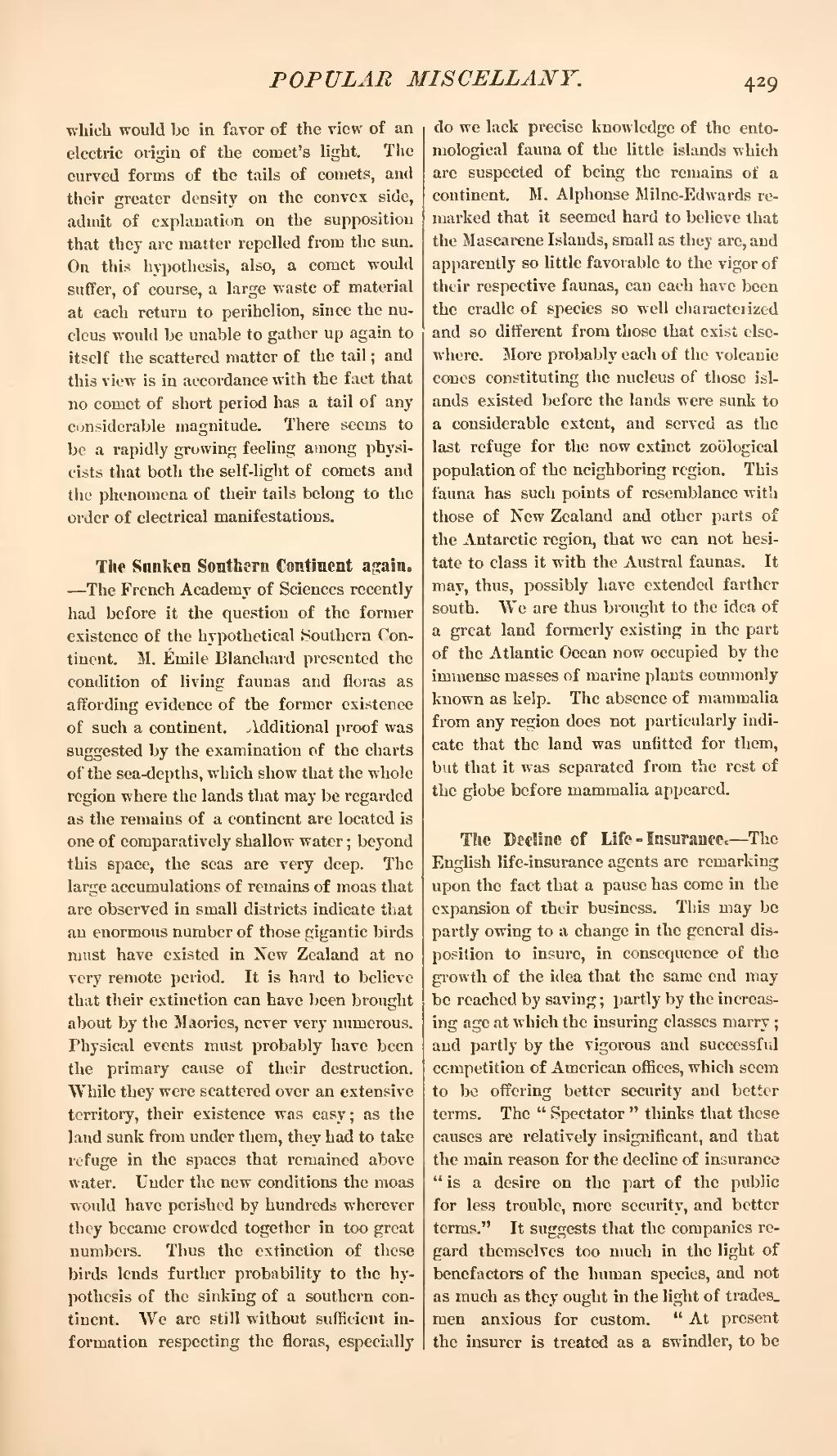which would be in favor of the view of an electric origin of the comet's light. The curved forms of the tails of comets, and their greater density on the convex side, admit of explanation on the supposition that they are matter repelled from the sun. On this hypothesis, also, a comet would suffer, of course, a large waste of material at each return to perihelion, since the nucleus would be unable to gather up again to itself the scattered matter of the tail; and this view is in accordance with the fact that no comet of short period has a tail of any considerable magnitude. There seems to be a rapidly growing feeling among physicists that both the self-light of comets and the phenomena of their tails belong to the order of electrical manifestations.
The Sunken Southern Continent again.—The French Academy of Sciences recently had before it the question of the former existence of the hypothetical Southern Continent. M. Émile Blanchard presented the condition of living faunas and floras as affording evidence of the former existence of such a continent. Additional proof was suggested by the examination of the charts of the sea-depths, which show that the whole region where the lands that may be regarded as the remains of a continent are located is one of comparatively shallow water; beyond this space, the seas are very deep. The large accumulations of remains of moas that are observed in small districts indicate that an enormous number of those gigantic birds must have existed in New Zealand at no very remote period. It is hard to believe that their extinction can have been brought about by the Maories, never very numerous. Physical events must probably have been the primary cause of their destruction. While they were scattered over an extensive territory, their existence was easy; as the land sunk from under them, they had to take refuge in the spaces that remained above water. Under the new conditions the moas would have perished by hundreds wherever they became crowded together in too great numbers. Thus the extinction of these birds lends further probability to the hypothesis of the sinking of a southern continent. We are still without sufficient information respecting the floras, especially do we lack precise knowledge of the entomological fauna of the little islands which are suspected of being the remains of a continent. M. Alphonse Milne-Edwards remarked that it seemed hard to believe that the Mascarene Islands, small as they are, and apparently so little favorable to the vigor of their respective faunas, can each have been the cradle of species so well characterized and so different from those that exist elsewhere. More probably each of the volcanic cones constituting the nucleus of those islands existed before the lands were sunk to a considerable extent, and served as the last refuge for the now extinct zoological population of the neighboring region. This fauna has such points of resemblance with those of New Zealand and other parts of the Antarctic region, that we can not hesitate to class it with the Austral faunas. It may, thus, possibly have extended farther south. We are thus brought to the idea of a great land formerly existing in the part of the Atlantic Ocean now occupied by the immense masses of marine plants commonly known as kelp. The absence of mammalia from any region does not particularly indicate that the land was unfitted for them, but that it was separated from the rest of the globe before mammalia appeared.
The Decline of Life-insurance.—The English life-insurance agents are remarking upon the fact that a pause has come in the expansion of their business. This may be partly owing to a change in the general disposition to insure, in consequence of the growth of the idea that the same end may be reached by saving; partly by the increasing age at which the insuring classes marry; and partly by the vigorous and successful competition of American offices, which seem to be offering better security and better terms. The "Spectator" thinks that these causes are relatively insignificant, and that the main reason for the decline of insurance "is a desire on the part of the public for less trouble, more security, and better terms." It suggests that the companies regard themselves too much in the light of benefactors of the human species, and not as much as they ought in the light of tradesmen anxious for custom. "At present the insurer is treated as a swindler, to be
